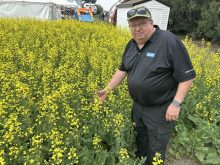The Flax Council of Canada is hiring the Canola Council of Canada to work on its behalf in foreign markets.
The flax council closed its Winnipeg office in January due to funding cuts but it wasn’t ready to completely exit the agriculture industry.
“We were certainly in the position of needing some way forward,” said Erwin Hanley, chair of the flax council.
That’s when negotiations between the two national farm groups started.
The result is an agreement where the canola council will provide core management services, such as finance and administration, in addition to conducting market development, market access and government relations services.
Read Also

First annual Ag in Motion Junior Cattle Show kicks off with a bang
Ag in Motion 2025 had its first annual junior cattle show on July 15. The show hosted more than 20…
The flax council will continue to have its own board of directors to provide direction on what needs to be accomplished.
“It makes sense to share our expertise and infrastructure because we share many members, supporters, goals and challenges,” Jim Everson, president of the canola council, said in a news release.
“Working together, we can get more mileage out of every trade visit and can speak with a stronger (voice to) tackle issues of mutual concern.”
Market development and market access efforts will be restricted to three key regions — China, the European Union and Japan.
It is a two-year agreement worth $254,000. The flax council will be providing $150,000 through a combination of membership fees and money it had in the bank. It has applied to Agriculture Canada’s AgriMarketing Program for the remainder.
The new budget is a considerable reduction from the council’s previous annual budget of about $700,000.
The council has changed its membership fee structure. Before there were four different categories of membership and a combination of flat fees and dollar-per-tonne fees.
Now there are two categories — a general membership that costs $10,000 per year and a special membership at $2,500 per year.
A general membership comes with a seat at the board of directors table. Eight entities have bought general memberships, including large exporters, provincial grower groups and a consortium of European buyers.
Letters have been sent to smaller exporters and ingredient companies asking them to sign up for special memberships, which do not give them a seat on the board but provides access to research, print material and other privileges.
The Saskatchewan Flax Development Commission and Manitoba Flax Growers Association plan to take over the agronomy work that used to be done by the council. SaskFlax has already hired an agronomist.
Hanley said most of the budget savings will come from not having to pay salaries of the president and two other staff members that were let go and for the office that no longer exists.
But it is also having to be more frugal in its market development efforts. And the work the council was doing promoting flax as a healthy food for human consumption has been put on hold.
Richardson International recently pulled more than $1 million in annual funding from the canola, flax and soybean associations in part because it was annoyed the groups refused to reduce overlap and costs by working together.
The company said it hasn’t shut the door on resuming funding if certain reforms were made by the organizations.
Hanley said the council hasn’t been in touch with Richardson about the changes but it will likely reach out at some point.
Richardson was contacted for this story but did not respond.


















